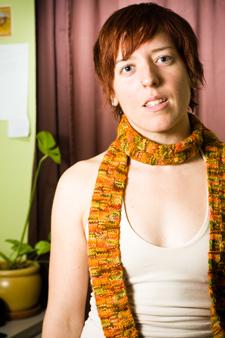The coffee shop where I agreed to meet Luna Allison was closed when I got there. Lights off, chairs up, doors locked. It was damn cold too, and dark out, the sort of it’s-freakin’-January dark even the streetlights can’t pierce. Cursing the coffee gods and blowing on my cold fingers, I walked the half-block up the street to the next coffee house. I was early and thought it better to wait someplace warm.
Among several people in this café was a girl, sitting by herself in the back. She stuck out because she was wearing a hot pink toque. Wouldn’t it be funny if that were Allison? Maybe I should just go over and say, “Hey, um, I know this is weird, but are you Luna Allison?” That seemed awkward, so I didn’t — what are the odds it was actually going to be Allison anyways?
It was Allison. She slipped out behind me and waited in front of the darkened building we had agreed on, looking irritated at the very locked doors. Some patchwork arrangements were made, and we finally got situated someplace warm, quiet and well-lit for this interview. She talks with her hands a lot, all flittering around as she spoke animatedly about her work and her life here in Ottawa.
The ironic thing about all this is that Allison’s work, she says, is about the connections between people, about the connection between strangers, between the performer and the audience.
“One of the most intimate things we can do as human beings is share the stories of what we’ve lived and I’m very interested in creating intimacy,” Allison insists.
“Intimate” is certainly a good way to describe Allison’s work. A spoken word artist, a short story writer, a poet, a performer and a self-publisher, she has a wide and impressive artistic repertoire. Regardless of her choice of medium, her work all shares a common thread — it’s deeply personal.
Her spoken word album Urban Lullabies is a mix of poetry, the occasional song, music and rhythm. It discusses everything from her “crush” on the city of Montreal in No Lady, to a tragi-comically dysfunctional relationship in Mythology to the liberating experience of masturbation in Homecoming. Upfront and sometimes startling, the album is funny, personal and touching. Her short-story chapbook Bittersoursaltysweet touches on similar themes — albeit more subtly — of individual experience, sexuality, desire and personal struggle. The writing is simple, straight-forward and refreshingly uncomplicated, furthering the deeply personal feel of the narratives.
“Everything I’ve ever done is about storytelling,” she says. She smiles.
“I believe in the power of personal narrative as a way of expressing what I value and what I hope other people will see value in.”
Allison is involved with the Banff Centre in Alberta and musicians Devin Johnstone and Robert Kuster in creating a 22-poem spoken word show revolving around her experiences as a survivor of sexual abuse. The project began in April of 2008 and she hopes to complete it soon. She is scheduled to perform the piece in New York later in the year, but currently has no plans for a local showing.
“Before this project, I’d never spoken about being a survivor. Given how personal my work is, it’s a noticeable absence. I’ve begun to feel like this part of my history is the missing link in terms of what I’ve been doing with my work all along. I feel like writing this show is a way for me to throw off the last vestiges of secrecy and shame related to the abuse,” she says.
Given the exceptionally personal nature of her work, I wonder, does it bother her to be so exposed before an audience?
“I’ve never gotten over the feelings of nervousness about getting up on stage and shedding my skin like I do, but I’m talking about things that a lot of people have been through or thought about,” she said, “It’s easier than you might think — I really believe in it, this process of revealing.”
Born in Toronto and educated in Ottawa, Allison lived for a number of years in Montreal. Back in Ottawa now and working on her spoken word project, thirty-one year old Allison writes daily. On an “average writing day” she gets up, writes three pages in her journal, has breakfast and does some more writing, either on her computer or, if she’s feeling something more tactile, on her 1960s Brother typewriter.
Allison continues to work in Ottawa, striving for the connection between people under the belief that we have more in common than we realize.
“Something really powerful takes place between the performer and the audience, something really tangible happens and I’m trying for (that power) every time.”

 Why you can trust Xtra
Why you can trust Xtra


